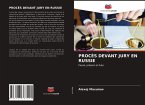The right of citizens to participate in the administration of justice is dictated by the need to ensure the independence, democracy, openness, fairness and legality of justice in our country. And such a measure of such peculiar people's control over the judiciary is the jury trial. Jury trials are based on two profound moral ideas, which are closely interrelated: the self-restraint of the state power and the mutual responsibility of the state and society to render verdicts. It is the awareness of this responsibility, both by the authorities and by the citizens, that gives the jury trial its true social value. It is not only the procedure that is significant, but also the goal-setting of the people participating in it, first and foremost the willingness to be jurors themselves.The evaluation of the significance of jury trial as a social institution of power by society has always been in the focus of the attention of processual scholars, and this is no accident. Public attitudes towards jury trials have a direct impact on the organization of the said court and the efficiency of the administration of justice.
Bitte wählen Sie Ihr Anliegen aus.
Rechnungen
Retourenschein anfordern
Bestellstatus
Storno








